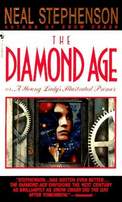
| Publisher: | Bantam |
| Copyright: | February 1995 |
| Printing: | March 1996 |
| ISBN: | 0-553-57331-4 |
| Format: | Mass market |
| Pages: | 499 |
The world of The Diamond Age or A Young Lady's Illustrated Primer is set far enough into the future that nanotechnology is ubiquitous. Each home, even poor apartments, has an assembler that can construct basic items from pre-programmed recipes and a city-wide feed of raw materials. Nations have splintered into smaller groups, some sticking to old nation boundaries and some highly dispersed geographically. One of the most influential is the Neo-Victorians, a group very strong in nanotechnology and interested in using the strictures of Victorian morality and ethics to apply structure to a world that seems dangerously unstructured.
A Victorian engineer has designed his greatest work as the story opens, a Young Lady's Primer that's designed to bond with and educate a young girl, telling and adapting stories to teach her how to thrive and survive in Victorian society. The Primer is for the daughter of a Victorian lord, but while trying to create a copy for his own daughter, the engineer loses a copy. That copy falls into the hands of a poor Shanghai girl named Nell.
The Diamond Age, while still featuring the occasional odd bit of world background or technical description, has a notably different tone than Stephenson's earlier (or later) work. He tried for a tone between Victorian and the very formal Western notion of wise Chinese philosophy; sometimes it's funny and sometimes it's annoying. The air of vague formality fits the descriptions of Victorian culture and sets off the violence in Nell's life in a way that makes some of her background more poignant (and I liked the old-style summaries at the start of each chapter), but it also lacks the manic energy and excellent pacing of Snow Crash and has notably fewer fascinating digressions. From time to time, the plot and action dragged noticeably.
By far the best part of this book is Nell, particularly her actions in the real world based on what she learned from the Primer. The Primer is an excellent concept, intellectually interesting for the way that it weaves together didactic tales and training exercises from Nell's life. After one works out what it's doing and how, it does gets a little repetitive, but it still serves as a dry counter-balance to Nell's complex and messy life. Mixed into the story, Stephenson is saying some insightful things about the interaction between people and education, and the difference between learning and experience. The Primer's advice frequently only works because Nell (and, unknowingly, the actor Miranda) give it a human twist. Other Primers lack that emotional connection, resulting in much different outcomes for the girls who own them.
Stephenson spends much of the book on weaker plots and squanders some excellent opportunities. The strongest emotional attachment in the book for me was with Miranda, an actor who is hired anonymously to read the stories in the Primer, not knowing what sort of job she's doing. She develops a strong emotional bond with Nell, and in time realizes that she's essentially raising Nell like a mother (Nell's father is dead and her mother goes through an endless series of abusive boyfriends). Nell thinks of her brutal life as normal and Miranda is shocked and deeply scared for her when she understands glimmers of it through the Primer acting assignments. The contrast highlights Nell's experience and forms a strong emotional hook.
Unfortunately, Miranda's search for Nell gets side-tracked and sucked into the weakest plot of the book, namely the Drummers. I suppose I understand where Stephenson was going with the idea of organic computing and subconscious communication, but I would have enjoyed this book much more if the Drummers had been left out entirely. Several main characters get sidetracked for annoying lengths of time into extended orgies with unconscious hive minds, and the influence this has on the overall plot varies between incomprehensible and annoyingly simple-minded. The only good part of the whole thing was Hackworth's subconscious communication with the Primer, and there were other, more interesting ways in which that could be handled.
The other plots aren't as annoying, but they often seem pointless. Hackworth, the Victorian engineer, could have been a more central figure but was mostly sidetracked. The secretive CryptNet organization is introduced and then never used. The Shanghai judge is a cliche, if an amusing one, and abruptly disappears halfway through the book. I wanted to read the story about Nell, Miranda, and the Primer; I only parts of that story in threads mixed with a lot of world setting and background that was competent but just not as interesting.
Even more frustrating is the lack of an adequate ending. After a nice set piece of epic confrontation in the streets of Shanghai, Stephenson leaves the reader with a scant, half-hearted climax to Nell and Miranda's story, including none of the emotion, attachment, or denouement that the reader has been waiting for. The other characters are simply dropped. One doesn't find out what happens to most of them, the abrupt ending leaves no time for emotional payoff, and Miranda ends up with a replaceable bit role in her own finale. Ugh.
This is still a good book. The Primer is a wonderful concept, Nell is a strong lead character, and even with the botched ending, the mediated interaction between Nell and Miranda is fascinating and tugs on the heartstrings as well as anything Stephenson has written. It just could have been better, and that's frustrating. There are top-notch ideas here, but I prefer the tone and digressions of Stephenson's other books.
Reviewed: 2005-12-19